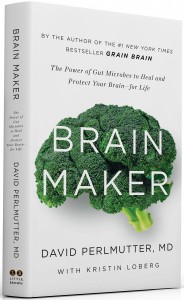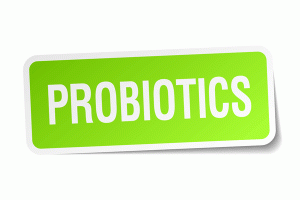Dr. David Perlmutter’s newest book, Brain Maker: The Power of Gut Microbes to Heal and Protect Your Brain – For Life covers the latest microbiome research and its vital relationship to brain health. Amazingly, this diverse population of organisms that lives in our body outnumber our own cells ten to one. What’s taking place in your gut directly affects any number of brain-related conditions.
Brain Maker reviews the current microbiome research on these particular conditions: autism, attention deficit hyperactivity disorder (ADHD), migraines, depression, anxiety disorders, multiple sclerosis (MS), Parkinson’s and Alzheimer’s. Gut microorganisms play a part in a variety of physiological processes including immunity, detoxification, inflammation, neurotransmitter and vitamin synthesis, nutrient absorption, satiety, and fat/carbohydrate utilization.
Basically our microbes affect almost everything health-related–from our moods, energy, brain clarity to metabolism.
Dr. Perlmutter tests the state of your unique microbiome by asking you 20 questions.
 Here are a few from that list:
Here are a few from that list:
- Did your mother take antibiotics while she was pregnant with you?
- Were you born by C-section?
- Were you breastfed for less than one month?
- Did you suffer from frequent ear and/or throat infections?’
- Are you gluten sensitive?
- Are you more than 20 pounds overweight?
- Do you have food allergies?
An affirmative answer would not be unusual for many of us reading this article. But he assures you that his book will tell you what this all means. (Hint: Affirmative answers are not good signs that your microbiome is optimized).
Through Dr. Perlmutter’s clinical experience and his research, Brain Maker teaches how our microbiome develops through our lifestyle choices, diet, environment and genetics.
I found it fascinating that he suggests, “gut bugs may as well be considered an organ in their own right.” Your gut bacteria’s DNA may have much greater impact on your health than your own DNA. I don’t remember learning anything about that in my high-school biology class.
There were so many intriguing topics in this book. But since I want to inspire you to take action to mind your microbes, I’ve going to focus on Chapters 8 through 10.
Chapter 8 Summary: Feeding Your Microbiome
According to Dr. Perlmutter, you can shift the array of gut bacteria in as little as six days with a new dietary protocol. Since it’s likely that our microbiome health has been reduced by adulthood, I find this encouraging.
If you follow these six essential keys, you can sustain your healthy microbiome.
- Choose foods rich in probiotics. Score one for fermented foods!
The main ferments that are covered include: live-cultured yogurt, kefir, kombucha tea, tempeh, kimchi, sauerkraut, pickles, pickled fruits and vegetables, cultured condiments, and fermented fish, meat, and eggs. - Go low carb, embrace high quality fat. Avoid a diet centered on grains and carbs. Dr. Perlmutter points out that many of these foods contain “gut-busting microbiome-damaging gluten, whose downstream effects reach the brain.”
“Brain Maker” foods follow a general paleo template and include vegetables, low sugar fruit, fermented foods, and healthy fats (such as olive oil, coconut oil, grassfed tallow, organic/pasture–fed butter, ghee, avocados, and so on). - Enjoy wine, coffee and chocolate in moderation and unlimited tea. This section discusses research supporting why these foods may be beneficial.
- Choose foods rich in prebiotics. In a nutshell, these are foods (mostly fiber) that gut bacteria love to eat to fuel their growth and activity. These are non-digestible foods that are fermentable or able to be metabolized by the gut bacteria. Foods high in prebiotics include: garlic, chicory, onions, leeks, jicama, Mexican yams, sunchokes, raw dandelion greens and raw asparagus.
- Drink filtered water. Skip the chlorine, fluoride, and other heavy metals that are often found in tap water. These are gut-busting chemicals that are hard to avoid especially if you eat out or indulge in coffee/tea drinks while not at home.
- Fast every season. He cites some interesting research and history on why occasional or even regular fasting is helpful for maintaining our microbiome. Fasting can be done in many ways such as calorie restriction or intermittent fasting (complete restriction for 24 to 72 hours at regular intervals throughout the year). Dr. Perlmutter cites his protocol as no food, but lots of water (avoid caffeine) for a 24-hour period. If you take any medications, continue to take them (but if it’s diabetes medication, consult your doc first). He recommends doing this at least four times a year (consider doing the fast during the seasonal changes).
My Chapter 8 Review and Takeaways
I love that fermented foods got top priority and I also resonate with his general food recommendations. I am particularly encouraged to see the emphasis on quality, organic and well-sourced plant and animal foods.
I do wish there was more discussion on the quality of coffee, tea, chocolate, and wine since those are typically high pesticide foods if you don’t source them carefully. And he did not discuss any drawbacks associated with caffeine and alcohol consumption that can cause problems in our microbiome. Dr. Perlmutter doesn’t quantify what he means by moderation. I can tell you from working as a FDN practitioner, that the meaning of moderation varies a lot in people’s minds when they have to face their own reliance on coffee or wine.
Chapter 9 Summary: Go Pro, The Guide to Supplements
This is an interesting chapter where Dr. Perlmutter recounts a patient case utilizing probiotic enemas. A thirteen-old male was diagnosed with Tourette’s at age six and he had experienced several conditions (repeated extensive antibiotics for pneumonia, strep, dental surgery) by the age of five that severely damaged his gut microbes. His Tourette’s was worsening and instead of relying on potentially dangerous medications, Dr. Perlmutter suggested probiotic enemas as an alternative treatment. After several treatments, this patient was virtually symptom free. It’s amazing what a bit of probiotics can do, eh?
Before you consider trying this at home, be sure to check out Dr. Perlmutter’s disclaimers, recommendations and his recipe for yourself. It would seem to be a good idea to choose a high-quality probiotic supplement without odd or weird fillers if you attempt this experiment.
Here are Dr. Perlmutter’s five core probiotic species with a short summary:
 Lactobacillus plantarum (found in kimchi, sauerkraut and other cultured vegetables). This species is the most beneficial and can survive in the stomach for a long time. It reduces gut permeability, thereby reducing pathogens from entering and activating the immune system. This species has many more functions that are covered in detail in this section.
Lactobacillus plantarum (found in kimchi, sauerkraut and other cultured vegetables). This species is the most beneficial and can survive in the stomach for a long time. It reduces gut permeability, thereby reducing pathogens from entering and activating the immune system. This species has many more functions that are covered in detail in this section.- Lactobacillus acidophilus (found in fermented dairy products like kefir and yogurt). It can help curb Candida albicans in women, maintain balanced cholesterol and manufacture lactase, which is required to digest milk and vitamin K.
- Lactobacillus brevis (found in sauerkraut and pickles). This strain improves immune function and more importantly increases levels of the highly desirable brain hormone Brain-Derived Neurotrophic Factor (BDNF).
- Bifidobacterium lactis (found in fermented milk products). This strain is helpful in knocking out food-borne pathogens like salmonella and is proven to boost immunity.
- Bifidobacteriumlongum (one of the first bugs to colonize our bodies at birth). This species has been associated with improved lactose tolerance, preventing diarrhea, food allergies and the growth of pathogens. It’s also thought to reduce anxiety and help maintain healthy cholesterol levels.
These strains all provide different benefits but these are the ones that best support brain health according to Dr. Perlmutter.
Chapter 10 Summary: The Brain Maker 7-Day Plan
This chapter promises that you can “Eat your way to a healthier brain.” This week’s worth of meals is heavy on vegetables, fish, neat, poultry, eggs and nuts. Sound like Paleo, doesn’t it? Again, the emphasis is on choosing grass-fed, organic and wild whenever possible. There is also a reminder to try to incorporate 30 minutes of exercise most days of the week.
This chapter is very broad in it’s recommendations. There’s not much guidance on macronutrient ratios or how to sort out how much you might need to eat each day for your health needs.
For the most part, the meal plan seems reasonable, although four of the seven breakfasts consist of 1 cup of yogurt with crushed walnuts and blueberries and tea/coffee (optional). I’m surprised that fermented dairy was given so much emphasis in this weekly plan since so many people have difficulty digesting milk products (even fermented).
I do applaud the effort to include a fermented food at each meal. But overall, I think I would be hungry following this sample plan. It might be more filling if the vegetable sides were swapped in the main course slot and the protein as a side dish status. Here’s an dinner example: 3-ounces steak topped with pickled salsa with a side of greens dressed in balsamic vinegar and olive oil,; optional: kombucha or green tea. Would this keep you satisfied?
might be more filling if the vegetable sides were swapped in the main course slot and the protein as a side dish status. Here’s an dinner example: 3-ounces steak topped with pickled salsa with a side of greens dressed in balsamic vinegar and olive oil,; optional: kombucha or green tea. Would this keep you satisfied?
The last section of the book includes recipes. I would advise caution using the fermentation recipes (avoid the raw fermented fish or the pickled eggs as those could result in food poisoning). In my opinion, several of the recipes could use clarification on temperature, duration and storage. Check my site for fermentation recipes and techniques if you want to try making your own ferments.
Although I did find the 7-Day Plan needing a bit of improvement, I get that this plan is likely significantly better then the Standard American Diet many are currently consuming. And for many Brain Maker readers, this may be their starting point. For you more seasoned Paleo devotees, you will be ahead of the game and you can use the 7-Day plan to inspire you to make some changes in your approach to better support your brain health and microbiome.
Overall, I highly recommend reading Brain Maker. Another great book on a similar topic isMissing Microbes: How the Overuse of Antibiotics Is Fueling Our Modern Plaguesby Martin Blaser.
